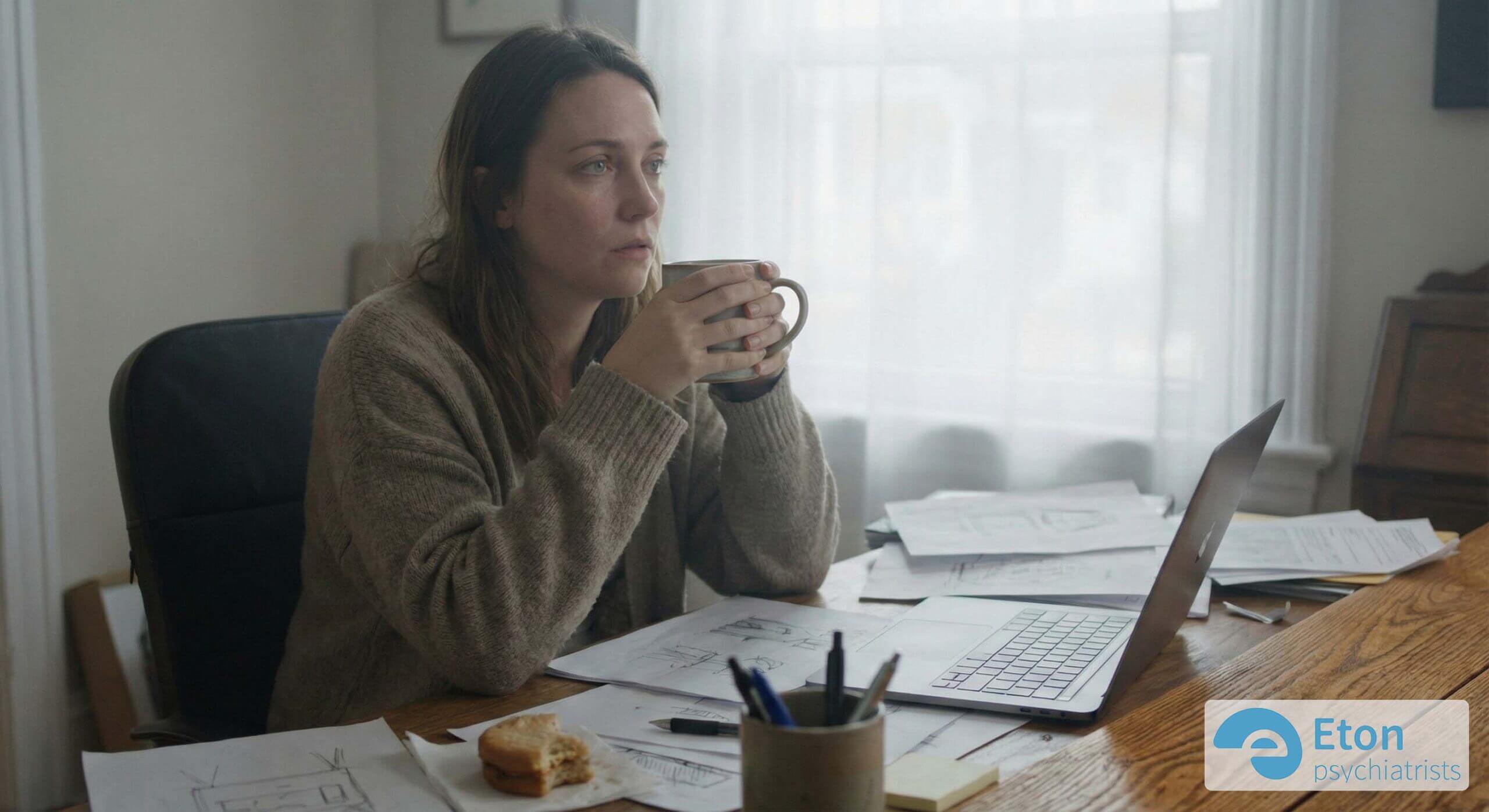
From Struggles to Strength: RJ’s ADHD and Autism Journey
RJ was referred to my clinic by his mother more than two years ago. At the time, he was struggling with anxiety and depression, as well as concerns about binge drinking. He had been dealing with mental health challenges since his early 20s.
According to his mother, RJ was unable to function on a daily basis, to the extent that he experienced serious suicidal thoughts and plans just weeks before his referral. He frequently had panic attacks and, when stressed, would turn to drinking as a way to cope. His severe mood swings were negatively affecting both his personal and professional life.
When I first reviewed RJ in my clinic, he attended the appointment with his mother. It quickly became evident to me that he exhibited traits of ADHD—though this had not been apparent to him before. Through subsequent follow-ups, RJ became more aware of the underlying causes of his struggles. Although he did not display typical symptoms of ADHD, we discovered during our sessions that he had difficulty initiating and maintaining social interactions. He turned to alcohol to make social situations easier and to escape from his busy, anxious mind. This observation later prompted me to suggest an assessment for autism, which proved beneficial.
Over the past two years, RJ has engaged well with his tailored treatment plan, which combined bespoke pharmacological and psychological therapies. This holistic approach allowed him to better understand himself without fear of stigma. He embraced his strengths, identified the root causes of his struggles, and made significant progress. Over time, he developed the ability to handle life’s challenges in a much more adaptive and resilient way.
RJ kindly agreed to share his experience to help other young people like himself—those who have tried different antidepressants and treatments with little success—to find a path toward improved mental health and a fulfilling, sustainable life. Below, I share his story in his own words, with the hope that it will inspire and provide hope to others seeking a turning point in their lives.
As a mental health professional, I am honored to have been part of RJ’s journey toward self-discovery and growth. I hope that his story, along with others shared in this blog, will guide those who are searching for the right kind of help.
RJ’s Story: Path to Recovery – ADHD/Autism Diagnosis
I knew I was different from a relatively young age, I always struggled to maintain relationships with others and had difficulty regulating my emotions. However, academically it was not apparent that I was different from my peers, always obtaining above average grades, in secondary school, 6th form and university. It was however clear that I studied differently from others, whilst most would spend the weeks, or months prior to an exam studying, I would be beginning my revision a few days prior to the date of the exam, driven by the necessity to achieve and pressure the lack of time provided me was an environment that although I found stressful I definitely thrived in. To my teachers this seemed questionable, as my predicted grades were always considerably lower than the examination grade I actually achieved. Another notable point is that every report card all throughout secondary school I was described as easily distractible, a day dream and someone who actively distracted others from their work.
I was a very anxious child and this continued into my teenage years, as I could tell I was different from others and because my behaviours was regularly called out at school I had constant anxiety that I had said or done something that would mean people wouldn’t like me. Until I found alcohol, alcohol and shortly after cannabis, from the age of 14 stripped the anxiety from me and revealed the social skills that quickly allowed me to make friends. This however was short lived as I quickly required either alcohol or weed to function in any social situation outside of school.
Fast forward to 19, I was accepted in Roehampton University, initially training to be a primary school teacher, my bad habits had followed me and although no longer smoking weed drinking alcohol had become a daily ritual to function in social situations. This would have been the smart time to reach out to my GP, or even my family, to express how much I was truly struggling with my mental health but from the outside I appeared to be fine, I had plenty of friends, a girl friend and was visibly having a good time at every party or social event at university.
I do remember speaking to my GP about my drinking whilst attending an appointment for something unrelated, after confessing to drinking on average 5 pints a day, she advised that I should stop doing that, and that was the end of that, no follow-up booked, no referral, just the simple instruction to stop. In all fairness from the outside I was still radiating an ego that could be mistaken for someone who was confident and had their life together and so would not be high on a GPs priority list for helping. I was also very aware of the stigma surrounding mental health at the time, and so likely downplayed how anxious and depressed I was when I wasn’t drinking, at that time I truly believed confessing to struggling with ones mental health was unmasculine and I viewed taking anti-depressant medication as a sign of weakness.
I changed courses halfway through my first year as during my first placement I realised that teaching primary school children hungover was extremely difficulty. I enrolled in business management, and after 3 years graduated with a 1st from Roehampton university, I still to this day do not really know how but I do remember pulling many all-nighters at the library, with a 2litre flask of coffee shortly prior to the essays deadline.
Again, due to my academic achievements my alcohol issues, which at this stage the extent of the issue had become apparent to my close family, friends and particularly my girlfriend, was not properly addressed, and if anything considered a phase I would grow out of post-university. Alcohol also magnified the other issues I had, I was already an impulsive spender but adding alcohol to the mix meant that by the time I finished university I had maxed out my overdrafts and credit cards, and was relying on pay day loans to be able to continue to support my alcohol addiction.
Once university had finished and everyone went off to begin their careers I went off the deep end. It was no longer acceptable to drink during the day, as I had led myself to believe it had been at university and my anxiety was at its peak and every night I would go to bed dreading the next day.
I had started my first proper office job, and experienced my first ever panic attack. By now my ego had died and I was no longer able to maintain the appearance of being a confident and competent person. Intrusive suicidal thoughts had begun to enter my mind and I knew now I had to speak to my GP to see what I could do to rid myself of the unbearable anxiety and depression that was consuming me. I was prescribed one anti-depressant, went up to the highest dose but this was ineffective, I then went onto another anti-depressant and went up to the highest dose of that medication. The second one did help but I still found the world overwhelming and could not seem to perform in office roles, despite me labelling myself as an ‘intellectual’.
Something was clearly either wrong with me or wrong with the world, and as I was very sure the problem had to be me I then started to believe I must have some kind of brain tumour that was making me act this way. This had to be the reason I had limited impulse control, I could not stop my thoughts racing out of control, making me unable to maintain long term friendships and the reason why without a drink the world felt so overwhelming and just did not make sense.
Unsurprisingly I ended up in rehab, surprisingly not because I had hit rock bottom, at this point I had my own places, I had a good office job, and still had a girlfriend, but everything had become to much and after one particularly bad binge I said I can’t do this anymore, in my head all of my problems were because of alcohol and all my attempts to moderate my drinking had failed. It was only much later I realised that I was using alcohol to medicate my undiagnosed ADHD.
I spent 5 weeks in rehab, which I actually enjoyed, I got to escape the overwhelming world and have what seemed like a holiday in Wales and not drinking did make me feel better. 2 weeks after I left rehab I was drinking again, I had returned to my old life, old job, old habits and the world again had become to overwhelming to bare sober.
I had once again approached my GP and was told at this point there was nothing more they could do, no other anti-depressant would be more effective than the one I was currently taking and all they could suggest was to attend AA meetings or contact other alcohol related organisations.
My daughter was then born, and this is when things really got bad. Although my drinking had improved marginally, I was still drinking most days, lying about how much I’d drank, spending money I didn’t have and just all round not being a good father. My girlfriend at the time made the right choice and left me shortly after our daughter was born. The final straw being she caught me drinking during the day while I was working from home, after promising repeatedly things would change.
I knew that if I did not sort myself out I would not be able to see my daughter. I was desperate, and after exhausting all avenues with my GP I decided to see a private psychiatrist to hopefully get to the bottom of why my life had turned out this way. This is when I met Dr Rostamipour for the first time, in October 2022. I had attended the appointment with Dr Rostamipour at the Priory with my mum, and I remember being sceptical and also if I am being honest fearful, that like all the other doctors I had encountered before he would simply say there was nothing he could do and I would walk out of there still feeling hopeless. The appointment was initially to discuss depression and anxiety, and was not meant to be an ADHD assessment. The session was coming to an end and it appeared we would then be booking a follow-up session to discuss these matters further, but I could sense that Dr Rostamipour realised I was at rock bottom and needed help. After speaking with my mum about my behaviour as a child he decided to administer the ADHD assessment with me, which provided me with an initial diagnoses of having ADHD.
Prior to this day I had never heard of ADHD, but the incredible relief I felt to have received a diagnosis, and to be told there were coping strategies specifically for people with ADHD, that along with medication could help me turn my life around filled me with a sense of hope I had not felt in a long time.
It has now been 2 years since my initial diagnosis, and what a 2 years it has been. To be completely transparent I did go through a stage of denial a few months later, after doing extensive research online I felt that being labelled as ‘having ADHD’ was stigmatising and made me inferior to my peers. With the help of dialectic behavioural therapy, which was recommended by Dr Rostamipour, I have learnt to accept who I am, and both the positives and negatives of having ADHD.
Having ADHD has transitioned from something I was ashamed and embarrassed about, to something I have learnt to accept and something I am no longer fearful of people finding out. This took time and it is a deeply personally decision if you want to tell the people in your life, your family, your friends and even your employer, the decision is yours and may be appropriate in some situations and not in others.
I made the unconscious decision to tell my previous employer. My manager was aware of my mental health issues at this point and during our next one to one he asked me how my appointment to see a specialist had gone, without thinking I told him that I had been diagnosed with ADHD. I can still picture the look of concern on his face, as if I had told him I had a highly contagious disease, and shortly after that without warning I was put on a performance improvement plan. It appears that after this meeting it was decided that all my work had to be reviewed for potential errors, and as with anyone, if you look hard enough you will find them. This was not a particularly nice period and made me feel that ADHD was a red flag that indicated you were educationally subnormal and required regular ‘monitoring’, as if I was a ticking time bomb that at any moment would explode taking out the whole company with me.
Luckily due to the economic climate post Covid, I along with others, was made redundant and thankfully the place I now work is incredibly progressive in its views regarding neurodiversity.
I was also diagnosed with Autism about a year ago, which did further explain why I perceived the world differently. Fast forward to the present date and I am the most content I have ever been. I have learnt to accept myself for who I am whilst still being conscious of the skills required to function successfully. Although my mental health at times is not perfect, I no longer have panic attacks and my overall outlook on life is more optimistic. My relationships, both professional and personal, have also improved, and I am now able to manage stress and regulate my emotions better. I honestly do not believe this would have happened without my ADHD and Autism diagnosis, along with the right medication and literature. Getting a diagnosis is scary, and does take some time to come to terms with, but my life has become infinitely more fulfilling now I really know myself.



